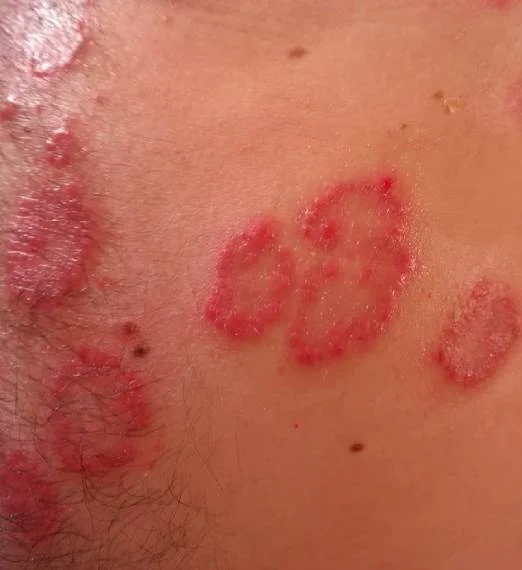What are the types of Fungal Infection?
1. Ringworm or Tinea
This fungal infection can affect skin, scalp, and nails. The skin may turn dark and flaky. The area may itch as the fungus grows and spreads out in a red circle, often called ringworm. It most commonly starts in the groin area where skin folds are sweaty and less ventilated. Heat and humidity are factors that help the infection spread. Ringworms are common in teens because of oily skin.
2. Athlete’s Foot
This skin condition also known as tinea pedis presents with itching, stinging, or burning sensation between toes or on other parts of the foot, especially in those who wear shoes for a long time or walk in wet surfaces or barefoot like farmers, army persons, police, sportspersons, etc. These fungi mostly grow in moist and warm areas and are more common in summer, hot, and humid climates. Peeling skin, scaly feet, itching, and blister formation are the common signs of an athlete’s foot.
3. Jock Itch/Dhobi Itch
It is also known as tinea cruris and can affect the skin on the groin area, inner thighs, and buttocks. These infections are more often common in summer, warm and wet climate conditions. This skin infection is mildly contagious and symptoms of jock itch include chafing, itching, burning sensation at the groin and thigh area, a red-circular rash with raised edges, and cracking like skin.
4. Candidiasis/Yeast Infection
This can affect areas that are wet for a long time, diaper area in babies, vagina, penis, in between toes, mouth (in HIV, diabetes and other conditions affecting immune system). Rashes, pimple-like bumps, itchy skin, burning sensations are the symptoms of yeast skin infections. Now being seen as white fungus in COVID-19 patients.
5. Yeast Infection
Vaginal infection can cause white discharge with itching. Penile yeast infection causes red spots, white cheesy material, cuts on the foreskin, and inability to retract the foreskin and is usually seen in diabetics.
Females and males experiencing these concerns must consult with the fungal infection doctor in Bangalore to improve their reproductive health by getting the best treatment for yeast infections.
Intertrigo is a type of yeast infection seen in skin folds as a whitish discoloration of skin in between the toes, in the thigh folds, and in between the buttocks. Babies and older people are more at risk.
Oral thrush can be seen as whitish patches in the mouth and throat and may cause severe throat pain and inability to swallow. It is common in hospitalized patients with low immunity, diabetics, HIV, and cancer patients.
6. Tinea Versicolor
It is a very superficial fungal infection with round to oval or irregular patches of brownish and whitish flakes usually in the head and neck area and armpits. There may be very mild or no itching, unlike other fungal infections. This infection occurs when Malassezia grows rapidly on the surface of the skin and several factors promote the growth of yeast infection like oily skin, weak immune system, hormonal changes, and excessive sweating.
7. Deep Fungal Infections (Very Rare)
It can include Mycetoma foot which can destroy the bones of the feet, Mucormycosis which can cause blindness as seen in COVID-19 patients, and other rare infections like sporotrichosis which can spread along lymphatic vessels of the leg. These are rare and usually caused in wounds neglected for several months or those with a weakened immune system.
8. Scalp Ringworm
This is a highly contagious infection and mostly affects small children. The sign of this infection is itching in the scalp, hair loss, red and scalp rash on the scalp and rash all over the body.
9. Nail Ringworm
This type of infection affects the finger or toenail causing thickened and deformed nails. It is also known as tinea unguium. This condition mostly affects the toenails than fingernails and is most common in adolescents and adults.
Symptoms of nail ringworm may include inflamed nails, thickening of the nail ends, and yellow color nails.


